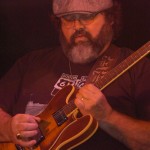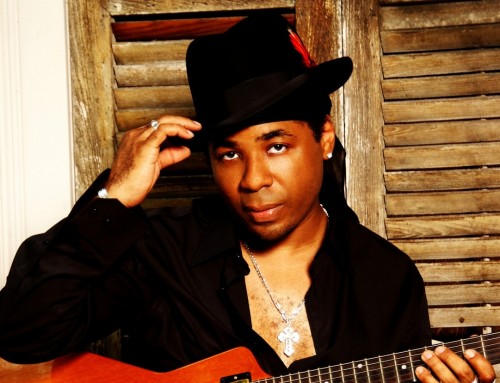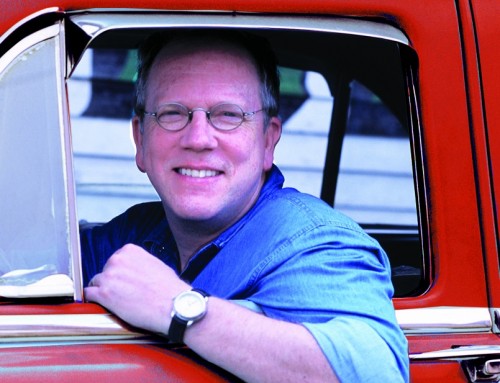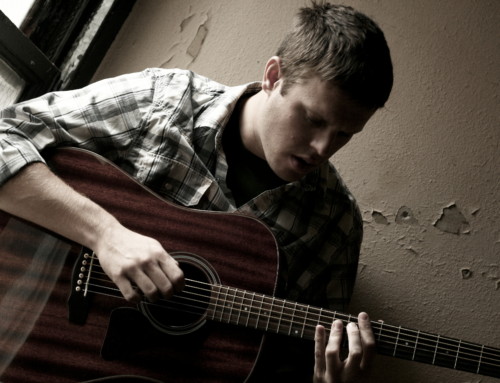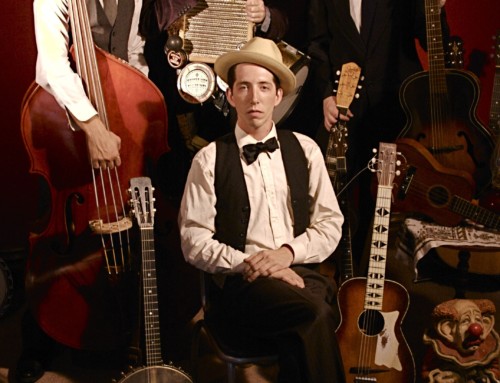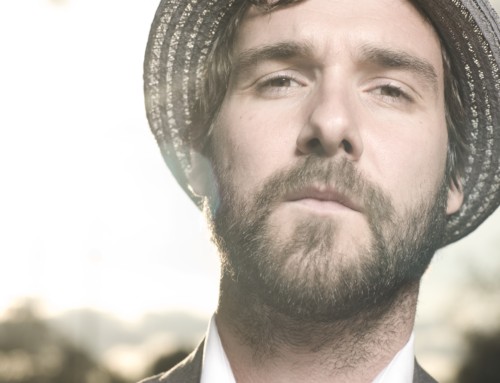When I asked who I should talk to about the music of the Quad Cities and river music, one name came up nearly every time: Ellis Kell. Born and raised in Rock Island, he’s been making a living as a musician and musical sage for most of his adult life. His first musical instrument was a trumpet, but he gave that up after an argument with a band teacher in his sophomore year in high school and adopted the guitar as his instrument of choice. Kell has been performing in the Quad Cities with The Ellis Kell Band since the late 1970s, playing a style that Kell describes as “blues-based country or rock, roots rock.” His band has opened for B.B. King, Robert Cray, Willie Nelson, Etta James, the Neville Brothers and many, many others.
Today, Kell is also the Director of Programming and Community Outreach at the River Music Experience (RME) in Davenport, the only museum dedicated to honoring the music of the entire Mississippi River Valley. Kell was one of the original staff members hired in 2003 and has had a hand in most every aspect of the RME during his tenure.
I talked to Kell at the River Music Experience in Davenport in September, 2009 at the very beginning of my research on music of the Mississippi River Valley.
NOTE (12/2016): Ellis was recently diagnosed with stage 4 cancer. To learn how you can offer a few words of support or contribute to help his family cover medical expenses, please go here.
Where did you grow up?
I grew up in the west end of Rock Island. I’ve lived here all my life, and I’ve always only been a few blocks or a couple miles away from the river. Spent a lot of time down there as a kid fishing. The river was always very therapeutic for me, just watching the big boats go by, whether I wanted to go down to the river and have fun or fish or just to contemplate my existence and what was going on. It was always very relaxing, and from the time I was very small, you know, I watched the big boats go by. My folks took me to St. Louis when I was real little and I saw the river boats down there and went on some of them. It was always a fascinating, like mystical world to me.
Kind of imagining what life would be like on the river?
Yea, life on the river, and in the old days, and then the steamboat pilots. I remember going down when the old River Queen boat was in St. Louis. I think I was about 10 years old when my mom and dad took me down there for dinner and they let you actually go up in the pilot house. And the River Queen was actually an old stern-wheeler and when I went up in the cabin it was just like something out of the 1800s—well it was. And there were old Civil War guns up there in the case and it was a step back into yesteryear, and to stand up there in that pilot house and look down that river toward the Eads Bridge, you know, it’s just a fascinating world.
One of the most interesting river-associated musicians that I ever had the chance to work with, I never played with him, but I booked him here on a couple of occasions, was John Hartford. He was a fascinating man, stellar artist and gentleman, fiddler, guitarist, tap dancer, river boat historian, river boat pilot. One of the interesting things that a lot of people don’t know is that he used to sneak up here almost every summer, to Le Claire, and he would pilot the Julia Belle Swain and later the Twilight, which is still there, and that was kind of his getaway, for the summer, for a week or two, he would come up here and go up and down the river as a river boat pilot or a deckhand or whatever. But I got to know him and got to see him come into Le Claire one time at the front of the boat waving to me with a derby on. You know it was like something out of a movie.
Did you parents have a relationship to the river like you?
My dad occasionally fished down at the river but not a lot to do with the river. One of my oldest friends, his father was a fireman and commercial fisherman. By the time he was three years old, he was sleeping in the bottom of a fishing boat. So I saw all that, the commercial fishing side of things. Musically, if you grow up by the river and were part of it I don’t think you can help but write music about the river to some degree. I’ve had a few songs. I wrote one called the Flood of ’65 because my dad worked on the flood here and it was such an epic flood for this area and one called Down to the Levee which is just about, you know, taking time to appreciate the people around you and make sure you tell them how you feel about them cause you never know what’s around the bend. So things like that. The river has been a metaphor for life for so many people around the world whether it’s here or the Nile and musically, the significance of this place being called the River Music Experience. The music started out in the Delta, and in the bayou, and in the backwoods, and the cotton fields of the Delta and, at one time, the only way you got from south to north, unless you were on a horse or on foot, was by boat. That river brought those earliest jazz musicians, and some blues musicians, from south to north and every town that they went through, the music changed; it took on its own flavor. And every town it passed through, it kept those basic roots but it added something new from the people in that area. But it all started down there on the river; that’s where it first started traveling. You know, it’s amazing to go up and down the river, you know it’s like Bob Dylan retraced the steps in Highway 61 Revisited and took the blues journey backwards, you know, from Minneapolis-St. Paul south back down to Clarksdale, Indianola, and those places.
So, what kind of music do you remember listening to as a kid?
The two biggest influences on me when I was a kid, one was Elvis and the other was the Beatles. And the Beatles loved Elvis. I learned eventually that all those folks who came over here in the British Invasion, you know who they wanted to sound like? Our blues and rock and rockabilly and early R & B artists. They wanted to sound like Chuck Berry and Elvis. The Rolling Stones idolized Muddy Waters. Well that was all music that I loved. Once I heard the blues and the black spirituals and the gospel, I was hooked and it’s been a part of my music ever since. I remember watching them
How would you define river music or music of the Mississippi Valley?
To me, river music has to be the music of the people. I think river music comes about as close to being as what you could say is America’s music: it’s music from the heartland, everybody knows “the river” we’re talking about is the Mississippi. That takes in all those main cities, from the jazz of New Orleans, the piano professors of New Orleans, the street bands, the funeral marches, all the way up to Memphis and the birth of rockabilly and the blues artists that originally came there like BB [King] in 1948 with shoes that didn’t match. Do you know what BB’s original nickname was?
No.
Shoebooty, because he had one shoe and one boot.
I bet he’s grateful that name didn’t stick.
Yea, that one didn’t look good on the marquee. And the birth of soul at Stax in Memphis; that was a whole different direction. Everything that happened in Memphis from four young white boys at Sun Studio. Each one of them loved the blues; each one of them loved country; each one of them loved gospel. Each one of them took it in a different direction: Jerry Lee [Lewis], Elvis, Carl Perkins, and Johnny Cash. And even though they all shared that same common root, to river music, or music born in the Delta, which is the river, they all went different directions with it. And that’s the beauty of American music, and I think that’s the beauty of river music. My river music may be a little more geared towards ballads and blues, and this guy over here may have a little bit of that but he’s a little jazzier, a little funkier and he brings a little more of the New Orleans tradition into it. And that’s OK.
Do you think music of the river is just a regional variation like music from the Northeast or the West might be?
I think river music is based in the basic building blocks of American roots music, which is the blues, country, gospel, jazz, those basic elements. Because all of those gave birth to rockabilly, which gave birth to rock and roll, which gave birth to hard rock, and soul music which gave birth to Motown which gave birth to hip hop and rap. But there are those basic elements of river music that I think transformed music not only from coast to coast but all over the world, like the British Invasion. The music in effect went around the world and came back to us in the form of the Beatles, the Rolling Stones, the Kinks. Like I said, our musicians were their idols. Paul McCartney was an Elvis freak and Little Richard freak. John Lennon idolized Elvis and Chuck Berry. So, I don’t think it’s regional, it’s like the life blood of American music.
Because this is where a lot of it started?
Jazz started on the river in New Orleans and ended up in Kansas City and it also ended up in New York City and it also ended up in Chicago.
And Poland and France.
And Chicago jazz is different from New York big city jazz which is different from Kansas City jazz. The basic thing came from the river, but every place it went, it took on the flavors of those people.
So it mixed with whatever regional styles were already there and it took on that particular style.
You know, country music today, commercial country music, and some of it I can take or leave and some of it is really good, you know, but country music today, commercial country music, has real strong elements of the blues, real strong elements of rock music in it; it’s not hillbilly, old-timey, Grand Ole Opry. That’s still there, but look how it’s transformed from country music 40 years ago, Hank Williams. So that, it never stops. It’s always evolving. I think, not to overuse simile or metaphor, but it’s like, what is it about the river—they say you can never step in the same river in the same place twice because by the time you’ve stepped in it, it’s already gone by. Well, it’s just like an eddy or a whirlpool, with the texture and structure of that river and that water is always changing; music’s the same way.
Who are really good contemporary river musicians or musicians who evoke river music styles?
I can’t see anybody here who does it better than Andrew Landers [who lived at nearby Muscatine at the time of the interview and now lives in Washington], and I am biased, and I’m sure if you talked to anyone around here they’d agree with me. He’s just, life songs and stories about everyday people and struggles in life but he’s very, very rooted here in the Midwest and this river valley.
Do you have to live next to the river to play river music?
I don’t know that…living close to the river helps, but I still think that you can understand and you can have the river music running through you without living two blocks from the river.
Me: It’s more about the musical style that grew up around the Mississippi…
And what the river brought together. So, you know, can you live in Phoenix and play river music? Sure you can. You’ve just gotta have the heart of it. Be inspired by it, that’s part of it.
Are we too, I don’t want to say evolved, but have things changed so much now that the Mississippi doesn’t serve that purpose anymore? Is it still a melting pot of musical styles, where there’s new music coming together or are things so disseminated around the place now that (influences come from everywhere)?
Well, I’m obviously biased because I live here [Quad Cities], but I still think it matters. You know, it’s always been the coasts. To make it big in music you can go to LA or you can go to New York or you can go to Nashville and then all of the sudden there was Austin, Texas. I think the best is yet to come for the Midwest and there is such amazing music coming out of the heartland now with people like Andy [Landers], Woodbox Gang, William Elliott Whitmore; we’re just at the start. And there’s no reason…you know it used to be, for so many years it was a big joke that, if you’re going to do anything in music, you’ve gotta get the hell out of there. I don’t think so. I think we can do it right here.
River Songs: Flood of ’65, Down to the Levee
Other Song You Shouldn’t Miss: Hunter’s Moon
Visit Kell’s website here.
